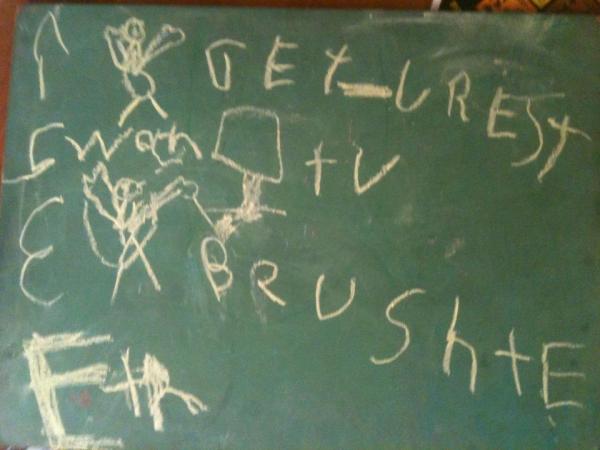At Edcamp Delta, Brad shared the following parable with me.
In the parable, researchers supposedly put 5 monkeys together in a cage, and in the cage there were some steps leading to some bananas. Whenever any of the monkeys would start to go up the steps to get a banana however, the hypothetical researchers would spray all of the monkeys in the cage with cold water. Every time any one of the monkeys went to get a banana, the entire group would get sprayed with cold water. After time, the monkeys would self-regulate and would attack any monkey that tried to make a move for the bananas, and the researchers stopped spraying the monkeys with water.
In the next stage of the experiment, they removed one of the original monkeys, and replaced it with a new one. The new monkey, not knowing about the cold water, would eventually decide to make an attempt to get one of the bananas, at which point the other four monkeys would attack the new monkey, preventing it from getting a banana. Over time, the new monkey learned not to make an effort to get a banana, and even though it had not experienced the spraying of cold water, it learned about the aversion to going to get a banana.
Over time, the researchers replaced each of the original monkeys with a new monkey, and each time, the new monkey learned not to attempt to get a banana as the other monkeys would beat it up. In other words, the researchers learned that the monkeys had passed along a cultural adaptation (avoidance of getting bananas) without having the original reason for the adaptation still present.
There was an experiment done with monkeys in the 1960s which is likely from where this parable was derived. Stephenson was able to train monkeys to avoid touching an object with blasts of air, and discovered that these monkeys could transmit this aversion to a ‘naive’ colleague (Stephenson, 1967). So while the parable seems to have never actually been tested, the results from Stephenson’s experiment suggest the parable is believable.
The point of this parable is that we can often repeat patterns as a form of peer pressure without understanding the original reasons for the behaviour. While we have an advantage over monkeys, which is that we can clearly articulate to each successive generation the reasons for a particular action that we take, unfortunately, we often do not share our reasons with the next generation, and only share the rules that we have established.
We see this experimented repeated over and over again in society. For example, suppose that in a subway station a door was locked in the early morning, and another door was unlocked. The first people to arrive at the subway station, not seeing anyone around, will test both doors, and enter through the one that works. Eventually traffiic gets a bit higher, and the door that works is always open because of constant traffic through the door. The other door, which doesn’t work, is assumed to not work since no one seems to be using it. If a custodian came by and unlocked the door, it wouldn’t be used, until someone came and actually went against the grain and tested the other door. We could call this person who tests the other door, even though no one else seems to be using it, an innovator.
Cultural pressure to follow what we’ve always done before, without really understanding the reasons why we follow the actions we do, is quite strong. How many of our structures in schools are done in certain ways even though the restrictions on doing them in other ways no longer exist?
References:
Stephenson, G. R. (1967). Cultural acquisition of a specific learned response among rhesus monkeys. In: Starek, D., Schneider, R., and Kuhn, H. J. (eds.), Progress in Primatology, Stuttgart: Fischer, pp. 279-288.
